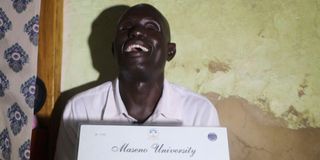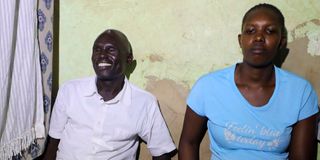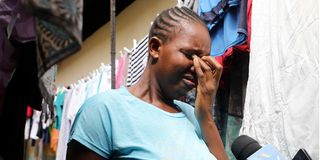
Denis Otieno Omondi during the interview at his home in Ukunda, Kwale County.
In the bustling town of Ukunda in Kwale County, a couple wakes up very early in the morning to scrub, rinse, and hang laundry under the scorching sun of the Coast to earn a living.
If all had gone according to his plan, Denis Otieno Omondi, 48, would instead be waking up to go teach in a secondary school. However, Mr Omondi, a blind graduate with a bachelor's degree in Special Education cannot be employed by the Teachers Service Commission because he scored a C- (minus) mean grade in the Kenya Certificate of Secondary Education (KCSE) examinations.
According to TSC guidelines, for one to be registered as a teacher, they must have scored a minimum mean grade of C+ (plus) and above or its equivalent in the KCSE examinations and also C+ (plus) in two subjects of specialization.
It is this technicality that has denied Mr Omondi a TSC number five years since he graduated after a tortuous academic journey. Mr Omondi was not born blind. He lost his eyesight at 23 and his life changed completely.
Beside him is his wife, Cynthia Achieng Otieno, 30, also a graduate with a bachelor's degree in Arts (French and IT), who is equally jobless. Together, the couple wash clothes in homes around Ukunda for subsistence.
Mr Omondi's sat his Kenya Certificate of Primary Education (KCPE) in 1994 at Bar Olengo Primary School in Siaya County but performed poorly scoring 36 out of 700 marks. His mother advised him to repeat but he refused. He then relocated to Mombasa, where he lived with his aunt. He was enrolled at Kisauni Youth Polytechnic but later dropped out due to lack of school fees.
“I then began working in a garage,” he says.

Denis Otieno Omondi during the interview at his home in Ukunda, Kwale County.
In 1998, he secured a job at a hotel as a maintenance officer – a blessing at first, but one that slowly turned into a cruel curse that robbed him of his sight by the age of 23. For five years he battled depression after losing his eyesight.
“My work was to wash the sanitary facilities and I was using chemicals which affected my eyesight. I was diagnosed and declared blind in various eye clinics and hospitals, including Light House and Lions Eye Hospital,” he recalled.
When he went to a hospital in Kikuyu, he met a young blind lady who motivated him and advised him to go back to school.
“I later joined Kibos School for the Blind Primary. It was a tough nut to crack. In 2003, his aunt took him to Thika Primary School for the Blind. By then, he was 30 years old, and the oldest in class.
The head teacher later transferred him to the Kenya Institute for the Blind in Nairobi, where he learnt Braille. He was later transferred to Machakos Technical Institute for the Blind.
Visually impaired teachers
“That’s where I learned that disability is not inability – after I met visually impaired teachers teaching us. My depression faded, and I regained hope. I met twenty classmates who had also lost their sight. Fifteen dropped out, but five of us soldiered on,” he said.
For two terms, they were in rehabilitation, orientation and mobility, learning how to do house chores.
He was later enrolled in the leatherwork and tannery department, where he learnt how to make and repair shoes.
In 2005, he sat for his Grade 3 shoemaking certification at Machakos Technical Institute for the Blind. Armed with the skill, he later returned to Mombasa with his classmate and opened a shoe repair shop at Kongowea Market.
“With a Sh4,000 start-up grant from friends, we bought tools and opened a shop at Kongowea Market. We were making a profit of Sh3,000 daily. But tragedy hit in 2007 during the post-election violence when they were evicted. That’s when he decided to return to school,” he said.

Denis Otieno with his wife Cynthia Achieng' at their home in Ukunda, Kwale County.
At the shoe repair shop, he had met Bishop John Otieno, who took them in and treated them as his children.
“I told him I wanted to go back to school, and with the help of well-wishers, I was admitted to Kibos School for the Blind in September 2008.”
“Everyone thought I was a teacher posted there because of my age. I was taken to Class Seven. The teachers looked for a sponsor to support my education. I scored 275 marks in KCPE in 2009 and was called to join four national schools, including Thika High School for the Blind,” said Mr Omondi, a father of four.
He joined the school in 2010 and completed Form Four in 2013. It is then that he scored a mean grade of C- in the KCSE examinations.
“I was later employed at Kibos Secondary School for the Blind by the board of management to teach music and CRE from Form One to Form Four,” he said.
In 2014, he enrolled at Maseno University to undertake a diploma in Special Needs Education (primary option).
The Doshi family bought him a Sh100,000 worth Braille machine from India. In 2015, he graduated with a credit in Diploma in Special and Inclusive Education.
He thought his days of begging were over, and that he would finally become a teacher. In 2016, he went to the TSC headquarters, seeking employment but he was advised to seek further studies to boost his chances.
Life has been unbearable
“I was told that with a C- (minus), I was only bridging. They advised me to pursue an undergraduate degree. They didn’t understand the struggle I endured to earn a credit while others with eyesight only got a pass. I decided to go back to Maseno for my undergraduate studies in Music, Braille and CRE,” he said.
He applied for a Higher Education Loans Board loan and was granted Sh60,000. At the time, the tuition fees was about Sh160,000 annually.
Mr Otieno would have graduated in 2019, but a university strike and the COVID-19 pandemic caused delays. That’s when he met his wife, who was pursuing her BA in French.
“She wasn’t advised on the best course. She had a B+ in KCSE. I wish someone had told her to take Education. She would be a secondary school teacher by now. These universities are just minting cash. They don’t advise students on career paths. Some courses will leave you jobless and tarmacking for years,” he said.
They both graduated in 2021. Mr Omondi attained a Second Class Honours (Upper) degree. He went back to TSC, but he was told the C- (minus) grade still hampered his chances of employment.
In 2023, he applied for an internship at the Public Service Commission and was selected. In April 2024, he was posted to the Likoni Sub-county Ministry of Education in the Customer Care Desk, where he earned Sh25,000.
He has applied for a TSC number thrice but has been denied due to his KCSE mean grade.
“I have applied to various private schools, called for interviews, and passed but I can’t get employment because I lack a TSC number. How are people with disabilities expected to get employment with all these barriers?” he asked.
Washing clothes for a living
Alongside his wife, they now wash clothes for people, earning around Sh300 daily.
“We charge Sh20 to wash a shirt and Sh30 for trousers, and Sh30 for ironing. My wife has equally been let down by the system. I hope President William Ruto will ensure equity for people with disabilities. We have the credentials, but we’re suffering in the streets begging like paupers yet we are qualified,” he pleaded.
His wife, 30, says life has been unbearable.
“I did my KCSE at Ulanda Girls High School and got a B+. I was selected to join Maseno University, where I did my undergraduate in Bachelor of Arts (French with IT), and got a Second Class Lower Division,” she revealed.

Cynthia Achieng', wife of Denis Otieno, during the interview at their home in Ukunda, Kwale County.
Due to her current situation, Ms Otieno says her mother has discouraged her siblings from pursuing higher education after completing their fourth form.
However, she says she would never discourage her four children from pursuing education.
Recently, outgoing CEO of the TSC Nancy Macharia said the agency has been unable to get enough special needs teachers.
“We have been advertising for these positions for special schools, but we cannot get applicants then we re-advertise. I do not understand. The umbrella body for special needs schools should give us a memorandum, we even encourage them,” said the TSC boss.
The Kenya National Union of Teachers urged the TSC to use the highest academic credentials while recruiting teachers instead of the KCSE results.
KNUT secretary-general Collins Oyuu said some people who scored a D in KCSE have gone ahead to study even to master’s level and should be employed using their highest academic credentials.
“Do you know that some of our university lecturers got D+ (plus) grades and furthered their education until they became graduate lecturers? Surely TSC, why are you stopping our teachers who have C plain grade, went and graduated with a degree from teaching Grades 7, 8 and 9? ” he posed.
Mr Oyuu said TSC has acknowledged a shortage in the Basic Education sector yet still questions the KCSE academic qualifications of the applicants.
“An individual living with a disability is supposed to be given special consideration. He is qualified, he should be employed on affirmative action. TSC has failed him. This is pure discrimination,” said Mr Dan Aloo, a special education expert.
He urged the National Council of People Living with Disability to take up the case and ensure justice is served.






